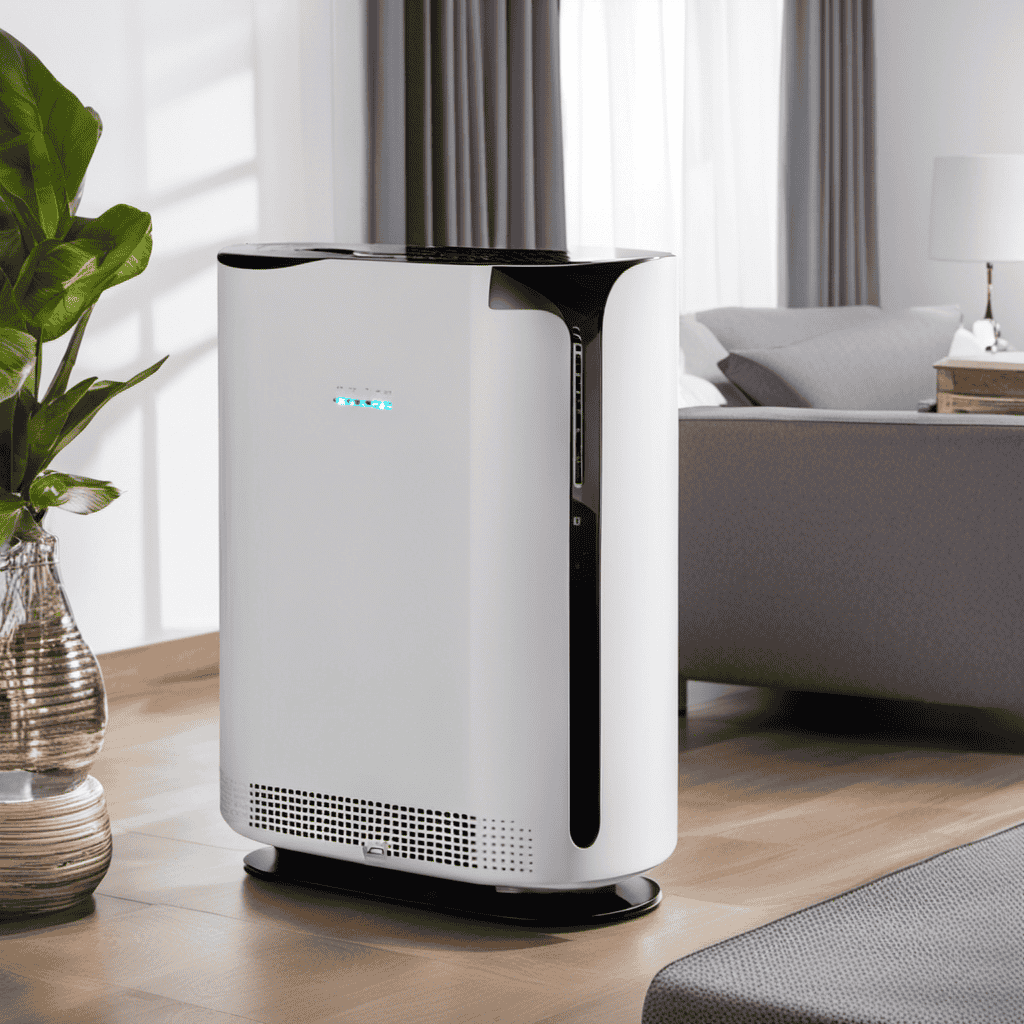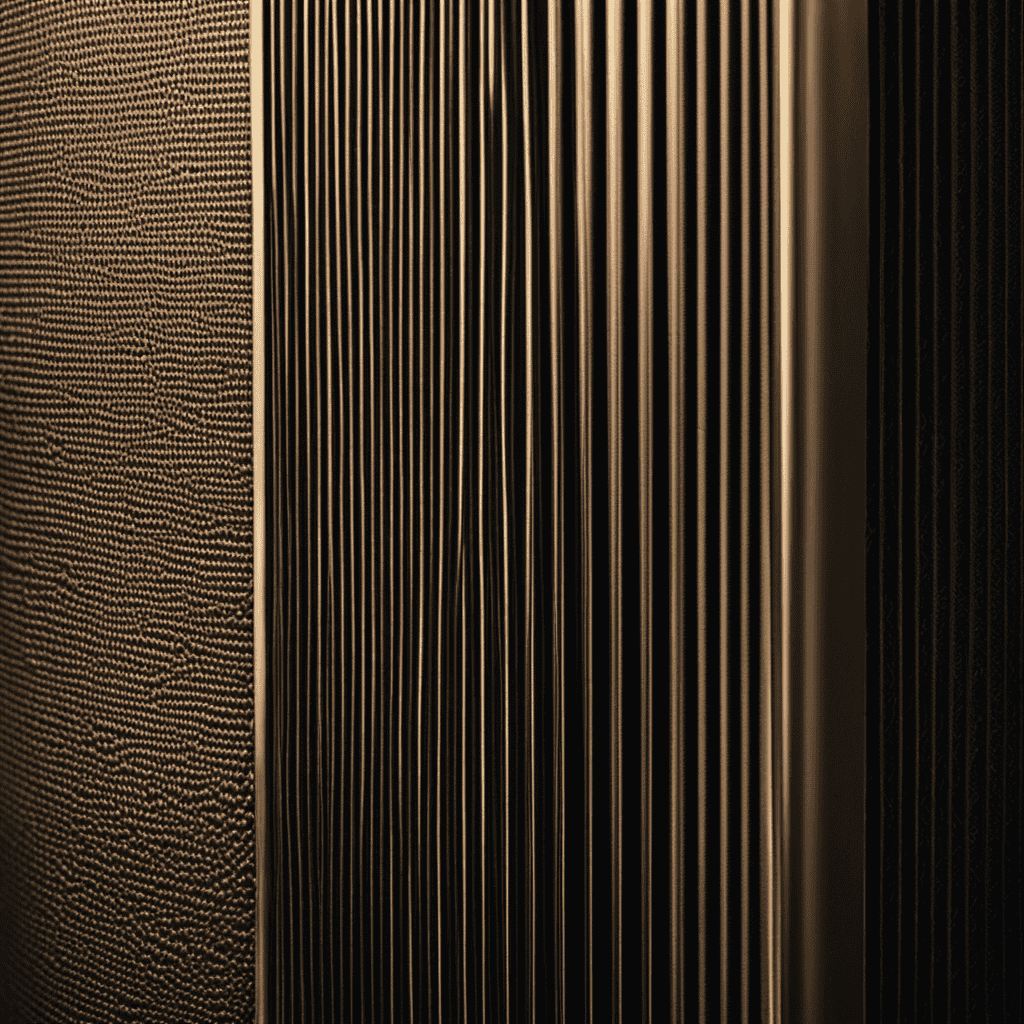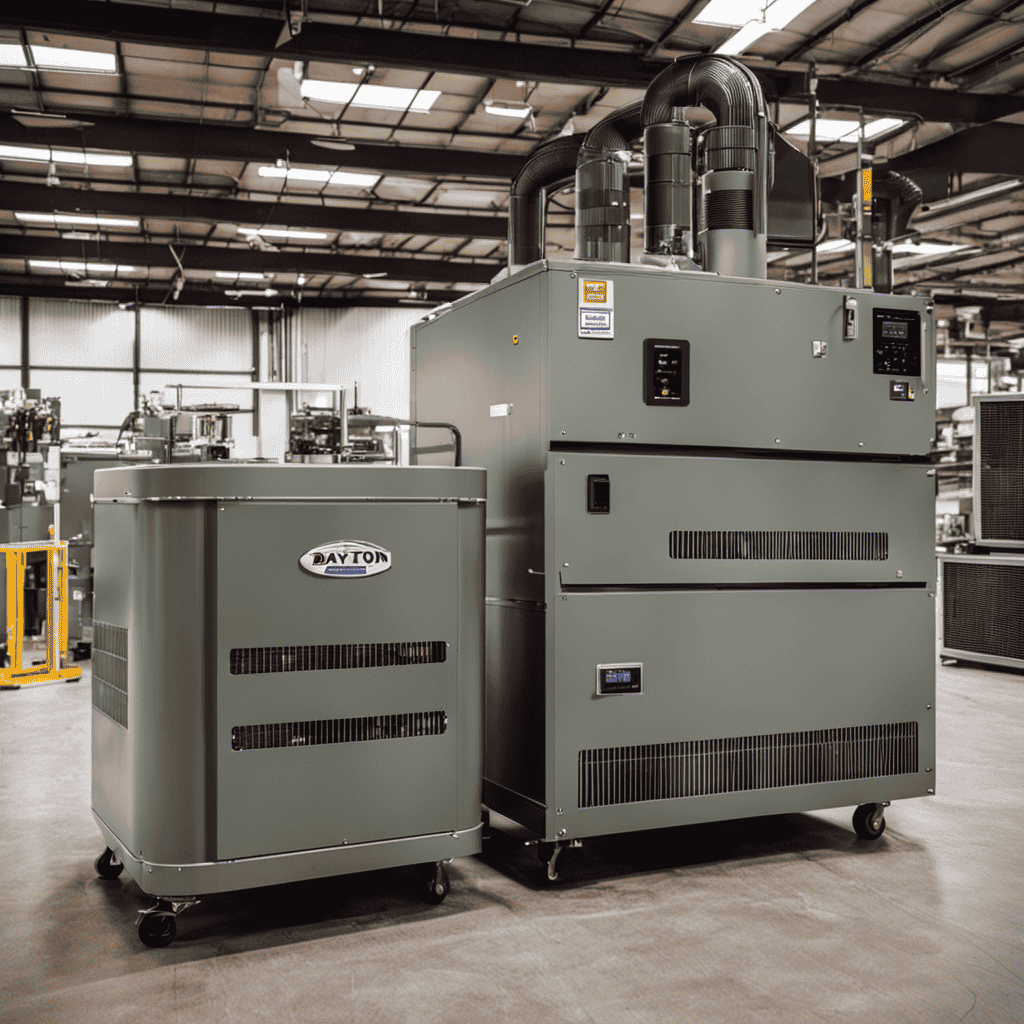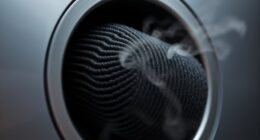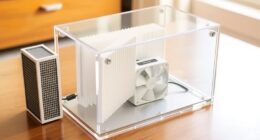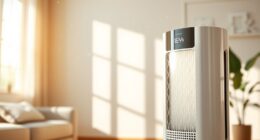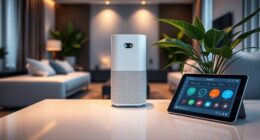Did you know indoor air can be up to five times more polluted than outdoor air? That’s why it’s crucial to have a dependable air purifier to maintain a healthy living environment.
One key component that plays a crucial role in air purification is an ionizer. In this article, I will explain what an ionizer does in an air purifier and how it improves air quality.
Additionally, I will provide tips for choosing the right air purifier with an ionizer to ensure you and your loved ones breathe clean, fresh air.
Key Takeaways
- Ionizers release negatively charged ions into the air.
- Negatively charged ions attach to positively charged particles in the air.
- Attached particles become too heavy to remain suspended and fall to the ground or surfaces.
- Ionizers can effectively remove smaller particles such as dust, pollen, and pet dander.
The Functionality of an Ionizer in an Air Purifier
An ionizer in an air purifier helps to remove airborne particles by releasing negatively charged ions into the air. These ions attach themselves to the positively charged particles in the air, causing them to become too heavy to remain suspended and fall to the ground or onto surfaces.
One of the advantages of using an ionizer is that it can effectively remove smaller particles, such as dust, pollen, and pet dander, which may not be captured by other filtration methods. Additionally, ionizers can help to reduce unpleasant odors in the air by neutralizing the charged particles that cause them.
However, there are also some disadvantages to consider. Ionizers can produce ozone as a byproduct, which can be harmful to human health, especially for those with respiratory conditions. Moreover, ionizers may not be as effective in removing larger particles or volatile organic compounds (VOCs) from the air.
Benefits of Using an Ionizer in an Air Purifier
You can experience the benefits of using an ionizer by enjoying cleaner and fresher indoor air. An ionizer is a device that releases negatively charged ions into the air, which attach to particles like dust, pollen, and pet dander.
Here are three advantages of using an ionizer in an air purifier:
-
Improved Air Quality: The ionizer helps remove pollutants from the air, reducing the number of airborne particles that can cause allergies, asthma, and other respiratory issues.
-
Odor Elimination: The ions emitted by the ionizer can neutralize unpleasant odors, such as cooking smells, pet odors, and tobacco smoke, leaving your home smelling fresh and clean.
-
Enhanced Effectiveness: When used in conjunction with a HEPA filter, the ionizer can enhance the overall effectiveness of the air purifier by capturing even smaller particles that may have been missed by the filter alone.
Using an ionizer in an air purifier can significantly improve the air quality in your home, providing you with a healthier and more comfortable living environment.
How an Ionizer Improves Air Quality in an Air Purifier
When using an ionizer in your air purifier, it improves the quality of the air in your home. Ionizers are highly effective in reducing indoor air pollutants.
These devices work by emitting negatively charged ions into the air, which attach themselves to positively charged particles like dust, pollen, and pet dander, making them heavier and causing them to fall out of the air.
This process, known as ionization, effectively removes these pollutants from the air, resulting in cleaner and healthier indoor air quality.
In addition to removing larger particles, ionizers also help to neutralize and eliminate harmful microorganisms, such as bacteria and viruses, by disrupting their structure and rendering them inactive.
Understanding the Technology Behind Ionizers in Air Purifiers
Understanding the technology behind ionizers in air purifiers can help you make informed decisions about improving your indoor air quality. Ionizers are an integral part of air purifiers, working to remove harmful particles and pollutants from the air. Here are three key aspects of the ionizer mechanism and ionization process in air purifiers:
-
Ionization: The ionizer releases negatively charged ions into the air, which attach themselves to positively charged particles such as dust, pollen, and pet dander. This process causes the particles to become heavy and fall to the ground, effectively removing them from the air.
-
Electrostatic attraction: The ionized particles are attracted to the positively charged plates or filters in the air purifier. This electrostatic attraction further aids in capturing and removing the particles from the air.
-
Ozone production: Some ionizers produce small amounts of ozone as a byproduct of the ionization process. While ozone can help neutralize odors and kill certain bacteria and viruses, excessive ozone levels can be harmful to human health. It is important to choose air purifiers with low ozone emissions to ensure safety.
Tips for Choosing the Right Air Purifier With an Ionizer
To choose the right air purifier with an ionizer, consider your specific needs and preferences.
There are several factors to consider when buying an air purifier with an ionizer.
First, determine the size of the room where the purifier will be used. It’s important to choose a purifier with the appropriate coverage area to ensure optimal air purification.
Additionally, consider the CADR (Clean Air Delivery Rate) of the purifier, which indicates how quickly it can clean the air in a given space.
Another important factor to consider is the noise level of the purifier. Some models can be quite loud, which may be bothersome in certain environments.
Finally, be aware of the potential drawbacks of using an air purifier with an ionizer. While ionizers can effectively remove airborne particles, they may also produce ozone, which can be harmful when inhaled in high concentrations.
It’s important to choose a purifier with a low ozone emission level to minimize potential health risks.
Frequently Asked Questions
Can an Ionizer in an Air Purifier Remove Odors From the Air?
Yes, an ionizer in an air purifier can remove odors from the air. By generating negative ions, it neutralizes particles and eliminates pollutants, including odor-causing molecules, leaving the air fresh and clean.
Is It Safe to Use an Air Purifier With an Ionizer Around Pets or Children?
Using an air purifier with an ionizer around pets or children requires safety precautions. Potential health risks include ozone exposure, respiratory irritation, and asthma symptoms. It is important to follow manufacturer instructions and monitor air quality.
Will an Ionizer in an Air Purifier Affect the Humidity Levels in a Room?
An ionizer in an air purifier can improve air quality by releasing negatively charged ions that attach to and neutralize airborne particles. However, it may not significantly impact humidity levels or the effectiveness of other purification technologies.
Can an Ionizer in an Air Purifier Help With Allergies and Asthma?
Using an ionizer in an air purifier can potentially help with allergies and asthma. It can remove harmful particles from the air, reducing indoor air pollution and providing potential health benefits.
How Often Should the Ionizer in an Air Purifier Be Cleaned or Replaced?
To clean an ionizer in an air purifier, turn off the device and gently wipe the ionizer blades with a soft cloth. Replacing the ionizer is not necessary as long as it is properly cleaned and maintained. Using an ionizer can help improve indoor air quality by removing airborne particles and reducing odors.
How Does an Ionizer Function within an Air Purifier Compared to a Regular Air Purifier?
An ionizer versus air purifier works differently to clean the air. While a regular air purifier uses filters to trap particles, an ionizer releases negative ions to attach to airborne particles, making them heavy and fall to the ground. However, ionizers may produce ozone as a byproduct, which can be harmful in high concentrations.
Conclusion
In conclusion, the ionizer in an air purifier is a game-changer for improving air quality. Its ability to release negatively charged ions into the air helps to neutralize harmful pollutants and allergens.
This technology, combined with the filtration system of the air purifier, ensures that the air you breathe is clean and fresh.
Choosing an air purifier with an ionizer is a wise decision for anyone looking to create a healthier and safer environment.
Don’t wait any longer, take control of your indoor air quality today!
